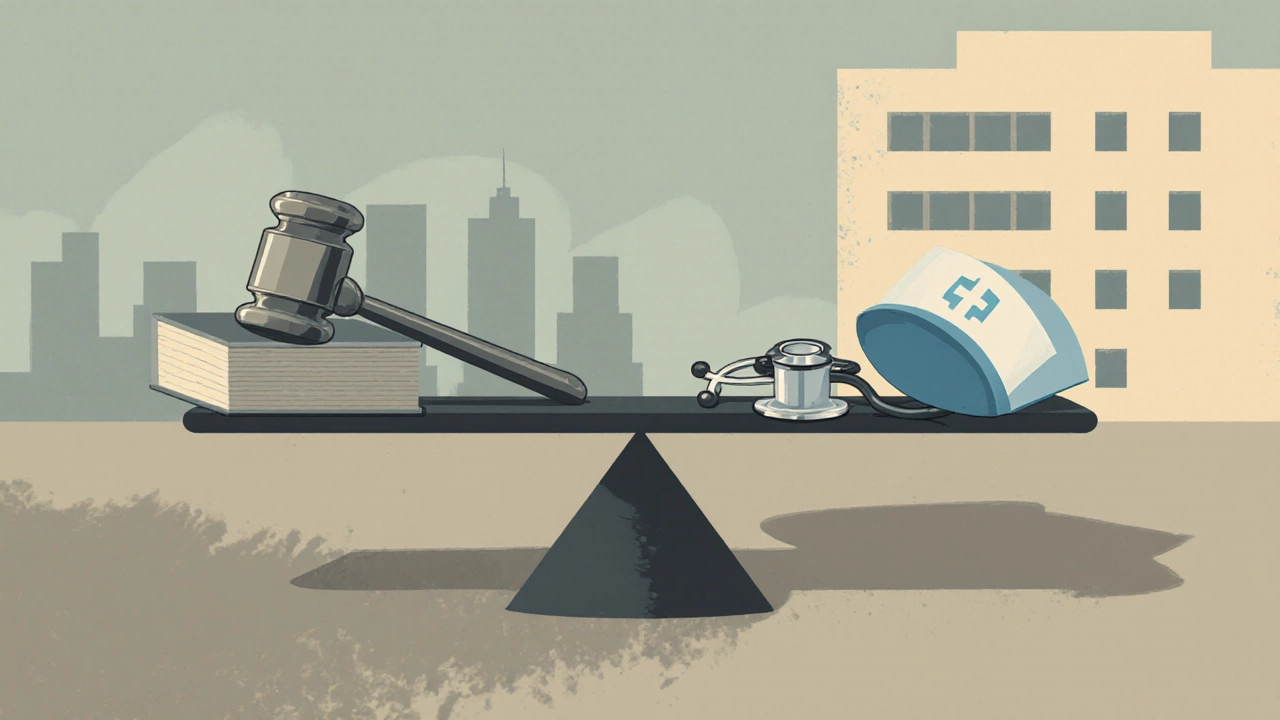Lawyer vs Nurse: Career Demand Comparison Tool
Lawyer
Highly demanding career requiring extensive education and rigorous licensing
Nurse
Essential healthcare role with intensive clinical training and patient care
Education Requirements
Lawyer:
- Undergraduate degree (3-4 years)
- Law school (3 years)
- Bar examination
Nurse:
- Associate or Bachelor's degree (2-4 years)
- NCLEX/Licensing exam
Workload & Schedule
Lawyer:
Billable hour targets, 60-80 hours/week, unpredictable schedules
Nurse:
Shift-based work (8-12 hours), 36-48 hours/week, regular shifts
Salary Comparison
Lawyer (US):
Median: $135,000
Top Earners: $250,000+
Nurse (US):
Median: $78,000
With Experience: Up to $100,000+
Career Outlook
Lawyer:
Growth: 4% (2024-2034)
Automation affecting entry-level roles
Nurse:
Growth: 9% (2024-2034)
Strong job security due to shortage
Key Differences Summary
Lawyer
- Higher earning potential
- Extensive education requirement
- High-pressure environment
- Unpredictable work hours
Nurse
- Strong job security
- Direct patient care focus
- Shift-based schedule
- Emotional and physical demands
When you compare lawyer and nurse careers, the debate feels almost inevitable. Both professions demand years of study, high‑stakes exams, long shifts, and a deep commitment to helping people. Yet the nature of the pressure, the daily routine, and the long‑term rewards differ in ways that can tip the scale for anyone trying to choose a path.
Education and Licensing: The Road to the Badge
Becoming a Lawyer is a marathon of academic rigor. Most aspiring lawyers first enroll in a Law School, which typically spans three years for a Juris Doctor (JD) degree in the UK or US. After graduation, you must clear the Bar Exam, a multi‑day test that evaluates knowledge of statutes, case law, and procedural rules. In the UK, the route includes the Legal Practice Course (LPC) or the equivalent Solicitors Qualifying Examination (SQE), followed by a two‑year training contract.
In contrast, a Nurse typically begins with a Nursing School. Programs range from 2‑year associate degrees (ADN) to 4‑year bachelor’s degrees (BSN). After coursework and clinical rotations, candidates must pass the NCLEX (National Council Licensure Examination) in the US, or the NMC (Nursing and Midwifery Council) registration process in the UK. The educational timeline can be shorter, but the clinical exposure is intense from day one.
Work Hours and Lifestyle: Clock‑In Realities
Lawyers often grapple with billable‑hour targets, especially in large firms. Junior associates may log 60‑80 hours per week, pulling late‑night research and client calls. Even senior partners, though enjoying more control, still face unpredictable schedules during high‑profile cases or courtroom weeks.
Nurses, on the other hand, operate on shift patterns-typically 8‑12 hour blocks. While a single shift can be exhausting, the schedule offers clearer start‑and‑end times, allowing for more predictable personal time. However, night, weekend, and holiday shifts are common, and overtime can quickly add up, especially in understaffed hospitals.
Salary and Benefits: The Paycheck Perspective
According to the latest data from the Bureau of Labor Statistics (2024), the median annual salary for lawyers in the United States hovers around $135,000, with partners in top firms earning well over $250,000. In the United Kingdom, a newly qualified solicitor earns roughly £30,000-£45,000, climbing to £120,000+ for senior counsel.
Registered nurses in the US earn a median of $78,000, while UK NHS nurses start at about £26,000 and can reach £45,000 with experience and specialization. Though the raw numbers favor lawyers, nurses often enjoy stronger public pensions, union protections, and more generous overtime pay in certain settings.

Stress, Burnout, and Emotional Load
Stress levels can be measured by factors like client expectations, life‑or‑death decisions, and the frequency of high‑stakes deadlines. Lawyers frequently cite anxiety over billable hours and the adversarial nature of litigation. A 2023 American Bar Association survey found that 37% of lawyers experience burnout, and 28% report severe anxiety.
Nurses confront stress in a different arena: direct patient care, sudden medical emergencies, and the emotional toll of witnessing suffering. The same year, a UK NHS report indicated that 45% of nurses felt emotionally exhausted, with 30% considering leaving the profession due to burnout.
Both professions demand resilience, yet the sources of pressure differ-lawyers wrestle with abstract legal battles, while nurses engage in hands‑on, often visceral, caregiving.
Job Market and Growth: Future Outlook
The legal field is evolving with technology. Document‑review AI and automated contract tools are reshaping entry‑level work, potentially reducing demand for junior lawyers in routine tasks. Nonetheless, the need for complex litigation, corporate advisory, and regulatory compliance keeps the market robust. The US predicts a 4% growth in lawyer employment through 2034.
Nursing, however, faces a chronic shortage worldwide. Aging populations and expanded healthcare services drive a projected 9% growth in nurse employment in the US and a similar upward trend in the UK. This demand translates into higher job security and more opportunities for advancement, especially in specialized areas like critical care or anesthesiology.
Decision Factors: How to Choose Between Law and Nursing
- Personal Motivation: Do you thrive on debate, policy analysis, and courtroom drama, or do you find fulfillment in bedside care and patient advocacy?
- Learning Style: Law leans heavily on reading dense statutes and crafting arguments; nursing emphasizes hands‑on practice and quick decision‑making.
- Time Investment: Expect at least 7‑8 years (including undergrad) to become a lawyer, versus 3‑4 years for a nursing bachelor’s.
- Financial Goals: Lawyers often start higher but may carry significant student debt; nurses earn less initially but benefit from steady demand and structured pay scales.
- Work‑Life Balance: Consider whether you prefer flexible, sometimes unpredictable hours (law) or shift‑based schedules with clearer boundaries (nursing).

Quick Comparison Table
| Attribute | Lawyer | Nurse |
|---|---|---|
| Typical Education | Undergrad (3‑4 yr) + JD (3 yr) + Bar Exam | ADN (2 yr) or BSN (4 yr) + NCLEX |
| Licensing | Bar Exam (US) / SQE (UK) | NCLEX (US) / NMC registration (UK) |
| Average Salary (US) | $135,000 | $78,000 |
| Typical Weekly Hours | 60‑80 (varies by firm) | 36‑48 (shift based) |
| Stress Index (1‑5) | 4.2 | 4.0 |
| Job Growth (2024‑2034) | 4% | 9% |
Bottom Line: Which Path Is ‘Harder’?
Hardness isn’t a one‑size‑fits‑all metric. If you measure difficulty by length of schooling, licensing hurdles, and billable‑hour pressure, law may feel tougher. If you weigh emotional strain, physical stamina, and shift intensity, nursing could be the harder climb. The real answer lies in aligning the type of challenge you enjoy with your personal strengths.
Frequently Asked Questions
Do lawyers earn significantly more than nurses?
On average, lawyers have higher median salaries, especially in large firms or corporate settings. However, nurses enjoy steady wage growth, strong union benefits, and often lower student‑loan burdens, which can balance overall earnings.
Which career has better job security?
Nursing currently faces higher demand worldwide due to aging populations and healthcare expansion, offering strong job security. Law also remains solid, but certain entry‑level positions are feeling pressure from automation.
How long does it take to become a qualified lawyer versus a nurse?
A lawyer typically spends 7‑8 years total (bachelor’s + JD + bar exam), while a nurse can qualify in 2‑4 years depending on the degree path, plus the licensing exam.
What are the main sources of stress for each profession?
Lawyers often stress over billable hours, client expectations, and high‑stakes litigation. Nurses face emotional fatigue from patient care, unpredictable shift schedules, and staffing shortages.
Can I switch from law to nursing or vice‑versa later in my career?
Switching is possible but requires meeting the educational and licensing requirements of the new field. Many skills-critical thinking, communication, and ethics-transfer well between the two.
